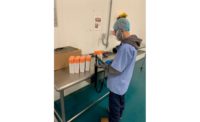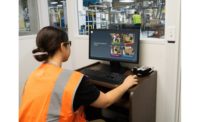Case study: Building resilience through quality data in the cloud




 For over a year now, food manufacturers have been grappling with the effects of COVID-19. Many in the snack and baking industry have dealt with significant operational challenges—from navigating supply chain disruptions and unpredictable demand spikes, to maintaining productivity with remote workers reduced onsite teams.
For over a year now, food manufacturers have been grappling with the effects of COVID-19. Many in the snack and baking industry have dealt with significant operational challenges—from navigating supply chain disruptions and unpredictable demand spikes, to maintaining productivity with remote workers reduced onsite teams.
And that’s all while trying to uphold usual levels of product quality and ensure that strict food safety standards are met.
To overcome these challenges and mitigate future risks, food manufacturers now urgently seek to build better resilience into their operations. One of the most effective ways to do so is by leveraging plant-floor data—a resource generated in abundance, and one I would consider to be the single most critical feature of a resilient production environment.
The power of plant-floor data
The vast amounts of quality and process data generated on the manufacturing plant floor can provide a wealth of insights to support everyday operations—how processes are performing; when concerning trends or problems arise; and where the most impactful improvement opportunities lie.
That very same data can also guide manufacturers in navigating major disruptions like we saw during the pandemic, helping them uncover ways to:
- Maintain efficiency, achieving a constant output even with fewer inputs (e.g., labor, raw materials, available machinery, etc.).
- Maximize output productivity, given the available input resources.
- Improve flexibility, rapidly responding to changes in supply and demand.
But to uncover these insights, food manufacturers need to do more than simply collect data. They need the ability to aggregate, analyze, and act on it—in real time, from anywhere. And that’s just not possible with the legacy systems and manual processes most plants still have in place for production monitoring and quality control.
Technologies for a digital production environment
Now is the time to move away from such outdated approaches, and instead, prioritize digital transformation. Snack food and baked goods manufacturers should consider investing in the following technologies:
- Automated data collection and real-time alarms: Next-generation quality management software can automate routine data collections and continuously monitor processes in real-time, which alleviates the burden on operators and quality teams. When an issue arises, alerts are sent immediately to relevant personnel. They can then take action to correct processes, which proactively prevents defects, reduces waste, and protects profits.
So instead of spending time manually recording data, making calculations, or pouring over charts, plant-floor personnel are free to focus on a myriad of other critical responsibilities.
- Quality in the cloud: At the pandemic’s outbreak, many plant managers, quality teams, and other key personnel shifted to remote work. However, those that relied on paper checklists or on-premise systems for quality control struggled to access critical data siloed within the four walls of their plant.
Cloud-based solutions for quality monitoring and analysis solve such accessibility problems. They can be operated remotely—from anywhere, at any time, and on any device. Whether onsite or remote, teams can connect and collaborate to monitor process performance and uphold food quality and safety standards.
- Enterprise-wide analytics: Cloud solutions also provide a unified repository for centralizing and standardizing quality data from all processes, lines, and sites in a manufacturing organization. With real-time and historical data stored in this repository, executives and quality teams can easily run analytics for timely insights into every facet of production.
These insights can be used to proactively identify opportunities to increase efficiency, productivity, and flexibility across their entire enterprise—creating exactly the kind of optimized production environment needed to overcome future challenges.
Tactical transformation
Despite the many benefits to be gained through digital transformation, food manufacturers are often hesitant to make the leap.
That’s largely because digital transformation has long been perceived as a long-term, enterprise-wide strategic initiative with high risks and high expenses. In reality, the cloud has made it a much more tangible goal—one that doesn’t have to be an all-or-nothing endeavor.
Manufacturers of all sizes can deploy cloud-based, Software-as-a-Service (SaaS) solutions to solve very specific challenges or address particular areas of weakness. SaaS solutions also offer flexible subscription-based models that keep costs low, and they can be rapidly deployed and easily scaled for a phased implementation.
This tactical approach minimizes risks and avoids overburdening maxed out operational and IT teams. Today the benefits of digital transformation can be attained in a matter of weeks, rather than years.
How one bakery gained real-time quality assurance with the cloud
Bakery on Main—a Connecticut-based producer of premium, gluten-free granola, oatmeal, and snack bars—is a great example of tactical digital transformation success.
Furthering its commitment to product integrity and consumer safety, Bakery on Main decided to modernize quality assurance at its East Hartford plant. Up until this point, personnel had recorded production data on paper, which quality managers would review at the end of each day. This made it challenging to spot out-of-control processes and delayed their response to costly issues.
In early 2020, Bakery on Main chose a new cloud-based, digital quality management platform. Implementation began with a proof-of-concept, digitizing data collection and analysis for a single process. Thanks to the ease of cloud deployment, the bakery quickly scaled implementation across all lines and processes in its plant.
Now, Bakery on Main has real-time visibility into quality and process data, and can detect production issues as they happen. Plant floor personnel are empowered to stop problems in their tracks, and rather than spending all their time digging through stacks of paper, quality managers now use data-driven insights for strategic optimization and improvements—which will, in turn, build better resilience for the future.
Ultimately, the investments made in digital transformation today will be the key to better resilience tomorrow. While no one can predict what the future holds, food manufacturers who can readily access and derive insights from their quality data will be well equipped to handle whatever comes their way.
About InfinityQS International, Inc.
For over 30 years, InfinityQS has been a global provider of manufacturing quality intelligence software and services. Powered by a robust Statistical Process Control (SPC) analytics engine, the company’s solutions—Enact and ProFicient—deliver unparalleled visibility and strategic insight across the enterprise, from the shop floor to the boardroom.
This extensive deep-dive capability enables manufacturers to improve product quality; decrease cost and risk; improve compliance; and make strategic, data-driven business decisions. Headquartered near Washington, D.C. and with offices in Seattle, London, Beijing, and Delhi, InfinityQS has thousands of customers around the world, including Ball Corporation, Boston Scientific, Graham Packaging, and Medtronic. For more information, visit www.infinityqs.com.
Looking for a reprint of this article?
From high-res PDFs to custom plaques, order your copy today!











